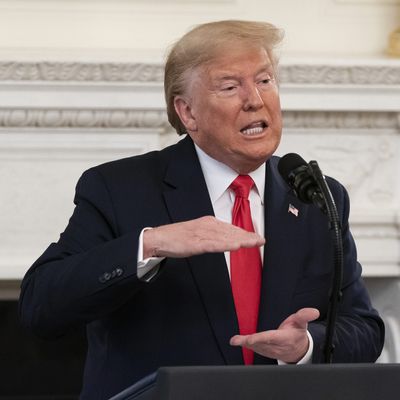
In recent weeks, President Trump has intensified his push to peel black voters away from the Democrats, or at least generate enough goodwill that they’re less motivated to mobilize against him when Election Day comes. At the urging of his son-in-law turned advisor, Jared Kushner, the president has highlighted the record-low black unemployment rates during his tenure and the gestures he has made toward reforming the criminal-justice system; the latter formed the centerpiece of his Super Bowl reelection ad, which featured Alice Marie Johnson, a black woman whose prison sentence he commuted. Trump’s efforts to cast himself as a reformer continued with his State of the Union address, in which he bragged about the First Step Act, a bipartisan bill he signed that shortened mandatory-minimum prison sentences for some federal crimes. His goal was unmistakable: By providing a counterpoint to his image as a raging bigot and proponent of brutal law enforcement, the president was trying to prove that his time in the White House has been better for black people than his critics will admit.
For this to work, the bare minimum requirement is that Trump stays on message long enough for it to stick. But the cracks are already showing. In remarks at the White House on Monday, the president suggested the best way to reduce fentanyl abuse in the U.S. is to follow China’s lead and execute drug dealers. “States with a very powerful death penalty on drug dealers don’t have a drug problem,” he said. “I don’t know that our country is ready for that, but if you look throughout the world, the countries with a powerful death penalty — death penalty — with a fair but quick trial, they have very little if any drug problem. That includes China.” This is untrue. The Brookings Institution found in 2016 that China had roughly 2.5 million residents who were addicted to drugs, which is to say nothing of its casual users, abusers, small-time dealers, or traffickers. That number has increased every year since the Chinese government started issuing its annual drug-enforcement report in 1998. Its zeal for addressing this problem by killing transgressors augments a marked lack of public sympathy for drug addicts and the deprioritization of government funding for their treatment, according to the report.
But beyond telling a demonstrable lie, which is common for Trump, he’s also lying in a way that undermines the focal point of his latest reelection push. Trumpeting one’s leniency in criminal and legal matters becomes absurd when paired with one’s praise for executing people convicted of nonviolent crimes. For the president, it’s a short trip. His reformist gestures have long been undermined by his calls for a crueler system overall, marked by his encouraging police to be more brutal toward arrestees and his edicts to recommence executing federal death-row prisoners. This is to say nothing of how the president’s appeals to black voters are undercut by his racism toward actual black people. He regularly derides majority-black neighborhoods, cities, and countries as filthy and crime ridden. In the criminal and legal context, he has been a vocal supporter of “stop and frisk,” the policy of detaining and searching random people for weapons and contraband — the vast majority of them black or Latino — which has been employed by the New York Police Department since 2002.
Combined with Trump’s calls to reinstate the death penalty in New York following the arrests of the Central Park Five, who were innocent, and his more recent praise for Israeli police profiling of the country’s Arab, Muslim, and Palestinian minorities, it seems outlandish that an official boasting Trump’s track record could be convinced to pursue the line of campaigning Kushner is encouraging. Political expediency is a clear motivator. Given Trump’s massive war chest, trying to convince even a sliver of black voters in swing states like Michigan and Wisconsin to stay home or consider supporting him is a worthy investment. But equally important is the president’s capacity for delusion. He has so repeatedly insisted that “the blacks love” him that he surely believes it by now, just as he’s promised so often to build a wall between the U.S. and Mexico that he’s had to fork over $18 billion in construction costs to make it real — despite its humble origins as a memory trick his advisors made him repeat so he would remember to talk about immigration. He has since started to fancy himself a serious reformer, even though the First Step Act’s provisions are modest, given the scale of mass incarceration, and a bipartisan reform bill landed on his desk only because Speaker Mitch McConnell denied legislators the chance to vote on a similar bill under President Obama.
And plenty enable him: One needn’t look far to find a progressive activist and commentator like Van Jones praising Trump as the “uniter-in-chief on an issue that has divided Americans for generations,” or sycophantic advisers urging him to campaign on his record with black Americans even as he prefaces said boasts with broadsides against Obama, who is enduringly popular among black Americans. It seems likely that these people encourage Trump’s delusions not because they believe them to be real but because they think suggesting them might manifest the outcomes they desire. It’s a risky proposition. As evidenced, they’re as likely to succeed as to get a frantically assembled border wall that collapses if the wind blows too hard and that store-bought power tools can saw through. Or they might get something closer to Trump’s comments about China executing drug dealers: the musings of a liar who either couldn’t be bothered to remember that criminal-justice reform is his new brand, or who doesn’t care if it’s actually believable.






























